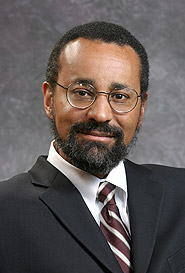Berkeleyan
Opinion
'These jobs are not for everyone'
![]()
| 19 September 2007
I spoke with Chancellor Drake at several points during the weeks he was in discussions with Erwin Chemerinsky about the Irvine deanship, and often this past week. It is crystal-clear to me that this controversy was not about Erwin’s politics nor potential controversy over his appointment. (Chancellor Drake does not shrink from controversy, but he did sugar-coat his reasoning when talking with Erwin — a mistake.) This was about Chancellor Drake’s loss of confidence that Erwin fully appreciated a central truth about becoming a university official: One must subordinate a significant measure of autonomy in favor of the interests of the institution.
The freedom we cherish and defend for faculty and students is simply not available to a dean or other leader in the same measure, because accepting such a position means accepting, for a time, that the needs of the community one serves must be paramount. In some respects, this is the antithesis of scholarly freedom and autonomy, and hence these jobs are not for everyone. And, thankfully, not forever.
 Christopher Edley Jr. (Jim Block photo) |
For example, after becoming dean at Boalt in 2004, I resigned as a member of the U.S. Commission on Civil Rights, allowing then-House Minority Leader Pelosi to recommend a replacement. The Commission majority had shifted ideologically, and I foresaw a period of acrimony in which I would be duty-bound to mount vigorous dissents in a very public way. This would have been fine — even great — for me as a professor, but I believed it would create unnecessary risks to my success as dean. Not risks in a political sense so much as risk in a mission sense. I wanted alumni focused on our plans for Berkeley Law School, not on my personal views or activities.
Chancellor Drake says that no UC regent tried to instruct him or recommend a course of action. I not only believe Drake but know enough regents personally to find pressure of that sort implausible. Yes, on some occasions they micro-manage, but even the least sensitive know that would be beyond the pale.
Skepticism about Erwin in some quarters is hardly surprising, given the diversity I described earlier. But the notion that this dust-up was about Erwin being liberal is risible. Chancellor Drake and everyone involved in the search knew full well of Erwin’s orientation, and welcomed it. After all, Drake has been outspoken for years about the importance of the public-service mission of Irvine’s new law school, and the full ideological spectrum on the Board of Regents subscribed to his vision. (I chaired the ad hoc committee that recommended to the regents that they approve Irvine’s proposal for a new law school, after 40 years of debate.)
There were also skeptics among faculty, alumni, and regents when I was being considered for the Boalt Hall deanship, based in part on my quite evident liberal leanings and political activity. After accepting the job I spent several months visiting skeptical alumni, and, in each meeting, discovered I had an invaluable asset: Our alumni want to love me, because they love this great law school, and they want its dean to be successful. As Irvine’s founding dean, Erwin will not have that asset, and his task will be all the more difficult within a watchful but not yet loyal community.
This important discussion is ill-informed by the media. Dean-designate Chemerinsky will soon learn that at UC there are enough here-and-now, real threats to academic freedom to focus on without the distraction of invented ones. Meanwhile, I enjoy my academic freedom and, as a public employee, my First Amendment rights, too. But trust me: My boss and (in my view) my faculty also have freedom — the freedom to fire me if I’m failing as dean, and return me to the privileged professoriat. Sounds pretty good.
Christopher Edley Jr. is Dean and Professor of Law at Boalt Hall School of Law.

